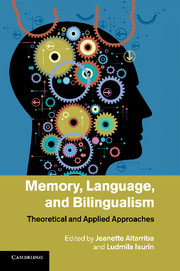Book contents
- Memory, Language, and Bilingualism
- Memory, Language, and Bilingualism
- Copyright page
- Contents
- Figures
- Tables
- Contributors
- Introduction
- 1 Bilingual memory:
- 2 Lexical competition in localist and distributed connectionist models of L2 acquisition
- 3 Working memory and (second) language processing
- 4 Working memory in simultaneous interpreters
- 5 Using electrophysiological measures to track the mapping of words to concepts in the bilingual brain:
- 6 Age effects in L2 learning:
- 7 Bilingualism, language, and aging
- 8 Crossovers and codeswitching in the investigation of immigrant autobiographical memory
- 9 Linguistic relativity and bilingualism
- 10 Testing effects for novel word learning in Chinese–English bilinguals
- 11 The lexicon in second language attrition:
- 12 Memory and first language forgetting
- 13 Future research directions:
- Index
7 - Bilingualism, language, and aging
Published online by Cambridge University Press: 05 November 2012
- Memory, Language, and Bilingualism
- Memory, Language, and Bilingualism
- Copyright page
- Contents
- Figures
- Tables
- Contributors
- Introduction
- 1 Bilingual memory:
- 2 Lexical competition in localist and distributed connectionist models of L2 acquisition
- 3 Working memory and (second) language processing
- 4 Working memory in simultaneous interpreters
- 5 Using electrophysiological measures to track the mapping of words to concepts in the bilingual brain:
- 6 Age effects in L2 learning:
- 7 Bilingualism, language, and aging
- 8 Crossovers and codeswitching in the investigation of immigrant autobiographical memory
- 9 Linguistic relativity and bilingualism
- 10 Testing effects for novel word learning in Chinese–English bilinguals
- 11 The lexicon in second language attrition:
- 12 Memory and first language forgetting
- 13 Future research directions:
- Index
Summary
Older adults often complain about age-related changes, including difficulty retrieving words during language production and comprehending complex sentences during language processing. Research data, coming primarily from studies with monolingual individuals, corroborate the self-reported age-related language changes. For users of two or more languages, little is known about whether both languages show comparable age-related changes or whether, as anecdotal evidence suggests, the first language might show more resistance to change than later-acquired languages. Also controversial is to what degree age-related cognitive decline in domains such as inhibition, switching, and alternating attention, accounts for the observed age-related language changes and whether these cognitive changes are attenuated in aging multilinguals. Indeed, recent research evidence suggests that multilingualism contributes to cognitive reserve that has been shown to delay age-related decline in specific cognitive skills, including switching and control abilities. Theories and data concerning this potential advantage of multilinguals and the challenging task of assessing the two (or more) languages of older multilinguals are discussed.
- Type
- Chapter
- Information
- Memory, Language, and BilingualismTheoretical and Applied Approaches, pp. 188 - 210Publisher: Cambridge University PressPrint publication year: 2012
- 2
- Cited by



